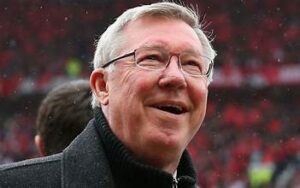Alex Ferguson Family History
Overview

Alex Chapman Ferguson was born on December 31st, 1941 to Alexander and Lizzie Ferguson in the Govan district of Glasgow. His father was a plater’s helper in the shipbuilding industry. He grew up in a tenement on Govan Road and attended local schools.
Football provided a way out for him. He began playing at a local youth club before signing a part-time contract in 1960 with the Scottish football club St. Johnstone (he was also then working part-time at a Govan shipyard). He became a full-time professional footballer with Dunfermline in 1964.
His footballing career ended in 1974 and he moved into management, first at St. Mirren and then at Aberdeen. His greatest success, however, came at Manchester United, whom he joined as manager in 1986 and remained in charge until 2013. During that period he won 38 trophies, including 13 Premier League titles, five FA Cups and two UEFA Champions League titles.
Shipbuilding along the Clyde
These Fergusons were to be found in the 19th century in the small town of Renton on the Leven river in West Dunbartonshire. Robert Ferguson was born there in 1830. He died young of typhoid in 1864. There were two sons, John and Robert, with his partner Ann Scullion and another child (apparently) with Mary Nielsen as she claimed child support from him.
Robert’s son Robert was recorded as settled in Renton in 1880 with a partner and baby son and working at a boatyard as a riveter. He like his father died young, in his case of TB at the age of forty-one in 1896.
Sometime along the line this family was Catholic and Robert’s son John was raised Catholic. His wife Janet came from a Protestant family and insisted that their son Alexander, born in 1912, be brought up Protestant.
John like his father was a riveter at Renton. He fought in the First World War but was invalided out of it after being gassed He was taken to a hospital in Glasgow and the family moved there to be closer to him. He died in 1923, the third of his family in a row to die young (typhoid, TB, and now being gassed).
After his death his widow Janet married a man named Johnny Miller and the family moved to Belfast. Her son Alexander Beaton Ferguson, having left school at fourteen, then worked at the Harland & Wolff yard before later returning to Glasgow and the shipyards at Govan.
Renton’s Footballing Heritage
Sir Alex may have got his football intelligence from Renton. This place was one of the eleven founding members of the Scottish Football League. The club, founded in 1872, were winners of the Scottish Cup in 1885 and 1888. Indeed in the latter year they went on to defeat the English cupholders West Bromwich Albion by a score of 4-1 in terrible weather before a crowd of 6,000 in Glasgow.
The players were ahead of their time in training for stamina and strength. Their secret weapon was Renton’s own famous “chicken bree.” The ingredients were never disclosed but were probably port wine swished with a couple of eggs and administered daily. However, there were no Fergusons among their list of players.
Alex Ferguson’s Family Tree
- Robert Ferguson (1830-1864) from Renton, Dunfermline m. Ann Scullion (1827-1894)
- – John Ferguson (b. 1853)
- – Robert Ferguson (1854-1896)
- Robert Ferguson from Renton, Dunbartonshire m. Catherine Mulhollan (1860-1894)
- – John Ferguson (1880-1923)
- – Mary Ferguson (b. 1883)
- – Catherine Ferguson (b. 1887)
- – George Ferguson (b. 1889)
- – Patrick Ferguson (b. 1891)
- John Ferguson from Dunbartonshire m. Janet (Jenny) Beaton (b. 1891) in 1912. She later remarried Johnny Miller and moved to Belfast
- – Alexander Ferguson (1912-1979)
- – John Ferguson (b. 1913)
- Alexander Beaton Ferguson from Dunbartonshire m. Elizabeth (Lizzie) Hardie (1922-1986) in Glasgow in 1941
- – Alex Ferguson (b. 1941)
- – Martin Ferguson (b. 1942)
- Sir Alex Ferguson from Govan m. Cathy Holding (b. 1948) in 1966
- – Mark Ferguson (b. 1968)
- – Darren and Jason Ferguson (b. 1972)
Click here for return to front page

